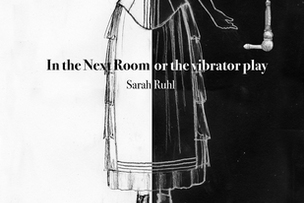Two performances remaining: April 6 at 2 & 8 p.m. in the Yale Repertory Theatre, corner of York and Chapel streets, New Haven.
By Sarah Ruhl. Directed by Stephen Kaliski. Produced by Jonathan Lian for the Yale Dramatic Association. Set Designer: Jason Sherwood. Lighting Designer: Jessica Greenberg. Sound Designer/Composer: Matt Sherwin. Costume Designer: Summer Lee Jack. Hair & Makeup Designer: Molly Weinreb. Performers: Calista Small (Catherine Givings), Tim Creavin (Dr. Givings), Marina Horiates (Sabrina Daldry), Christine Shaw (Annie), Paul Hinkes (Leo Irving), Zina Ellis (Elizabeth) and Kyle Yoder (Mr. Daldry).
Having just seen Sarah Ruhl in a panel discussion at the Humana Festival in Louisville, Kentucky, and having just read her ten-minute play which will premiere at Humana tonight, and having discussed Ruhl extensively last weekend with her teacher Paula Vogel and her frequent collaborator Les Waters (both interviews can be found at www.engine31.org), I was pleased to return home to find the Yale Dramat doing one of Ruhl’s most popular works.
Vibrator Play was not one of the several Ruhl plays which has received its world or East Coast premieres at the Yale Rep. It has, however, had numerous college and small theater productions in Connecticut, and that’s the circuit where I think it’s best appreciated. A show like this is catnip for college students. It deals with repression, sexual openness, the strictures of clinical science and the passions of the empowered mind.
In the Next Room is probably Sarah Ruhl’s least abstract, least “imaginative” play. It literally takes place in an early 20th century drawing room and the next room, the home office of a doctor in private practice. The story—about sexual frustration misdiagnosed as hysteria; about the happy erosion old-world morals and standards and the liberation of art, science and personal communications—unrolls as if it were Ibsen’s A Doll’s House, electrified. It can be performed without archness or irony, and that’s pretty much how the Dramat does it. Good thing, too: the audience provides plenty of loud laughs and whoops and gasps, which would get over-the-top if the actors were overplaying. There’s a steadiness and evenness to the enterprise, which makes the second half of the show play longer than the first (total running time is over two and a half hours) but which serves the script nicely. There’s plenty of humor emanating from stuffy sideburned men and chattering, flushed-faced women, but the central gravity of the show is not lost. This is a drama of awkward confessions and stifled feelings and corseted bodies. I was most impressed by how some of the actors—Zina Ellis as the nursemaid Elizabeth, Calista Small as the anguished Catherine Givings (wife of the doctor, played by Tim Creavin, who’s administering health cures with a vibrating electric metal phallus) and Marina Horiates (as friend/patient Sabrina Daldry)—maintained decorum in the parlor-room scenes. At one point in last night’s performance, Horiates spilled a cup of tea on her elaborate Victorian dress. She and Small covered the gaffe masterfully, so that it almost felt intentional—wet sheets and breast milk feature heavily elsewhere in the play.
It’s not until the very end of the show that In the Next Room expands its consciousness and distorts its environs, a Sarah Ruhl trademark. It’s interesting to compare this older work with Ruhl’s recent romances—her new version of Chekhov’s Three Sisters and her epistolary historical near-romance Dear Elizabeth, both produced by the Yale Rep in recent years. Most Sarah Ruhl plays, including her early hits The Clean House and Eurydice, dramatize difficult romantic choices. The Vibrator Play, true to its name, goes a bit further and actually explores the mechanics of sex.
As is their usual method, the undergraduate student-run organization has enlisted a professional director (New York-based Stephen Kaliski) and designers. It gives the cast a firm foundation on which to work. The show doesn’t feel exactly lived-in: These are college students taking on roles which would be greatly enhanced if they had actual intimate knowledge of marriage and childbirth. But they do bring the energy and exasperation and idealism which are the main tools for any Sarah Ruhl play. This is a solid, worthwhile, funny and poignant production, a fine choice for the Dramat and a neat introduction for those still unfamiliar with the extraordinary Sarah Ruhl.


Thank you for your really great info and respond to you. san jose car dealers
It’s as easy to celebrate Dr. Granville, the vibrator inventor and hero of the Hysteria movie, as it is to demonize his genital-mutilating contemporary, Dr. Baker-Brown. But the two Victorian physicians had much in common. Not only did both believe in hysteria as a legitimate medical condition, they both believed in men’s responsibility to exert complete mastery over women’s pleasure. One wanted to make women orgasm in his office, on his terms, and with his invention. The other wanted to ensure that women didn’t orgasm at all, thanks to his procedure. Their patients obviously experienced different results, and we’re rightly more outraged by Baker-Brown than by Granville. Those differences shouldn’t obscure the reality that each made his reputation by proposing new techniques to help men control women’s sexuality.